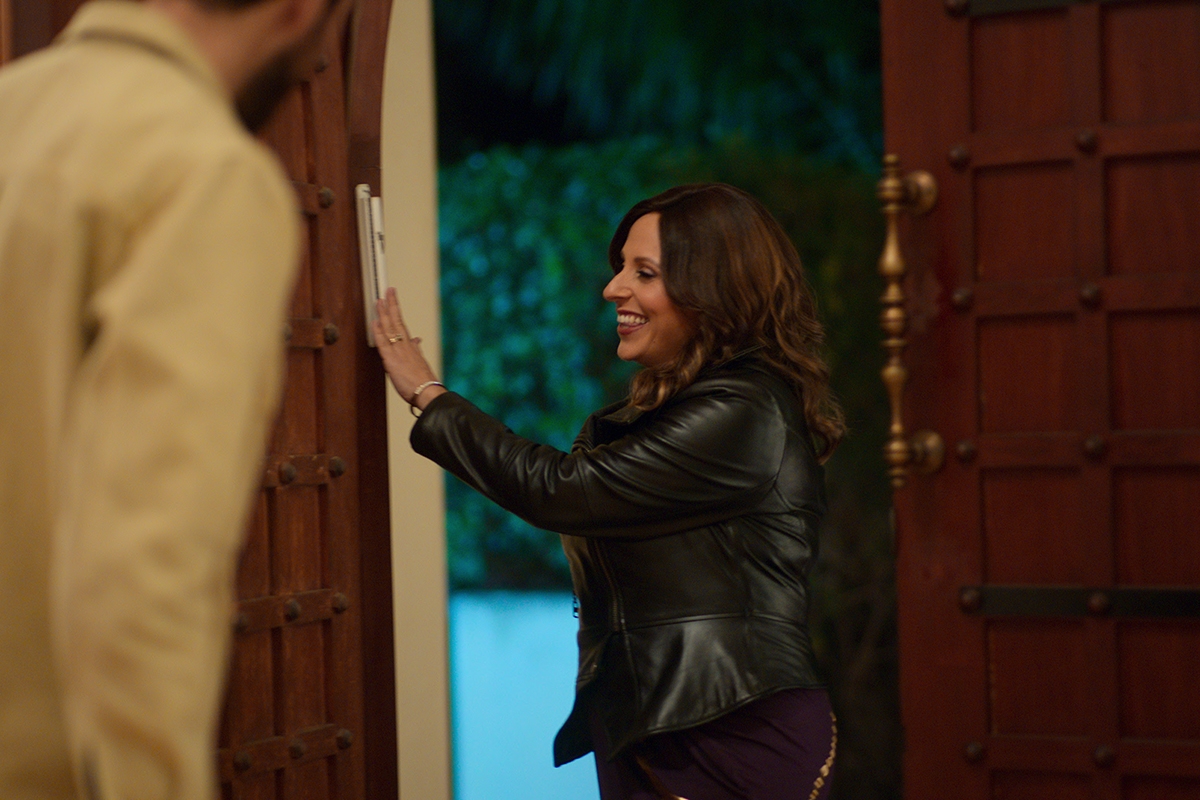I was so, so, so worried about “Jewish Matchmaking.” We all know that a Jewish-centered reality show aimed at a wider audience has the potential to be harmful at a time when antisemitism is on the rise. Jewish matchmaking may be an age-old tradition, but so is the one of spreading harmful stereotypes and misconceptions about who Jews are.
After watching the show, now streaming on Netflix, I can’t say that I have no reason to worry. Not everyone on “Jewish Matchmaking” makes for excellent PR for the Jews. But luckily, the one person who carries this show on her extremely supportive shoulders — matchmaker Aleeza Ben Shalom — more than makes up for that.
Ben Shalom doesn’t just serve as our guide through the foibles of the love lives of Jewish singles — she, perhaps inadvertently, helps the viewer navigate the tangled world of modern Judaism and what it means to be Jewish today. As someone who grew up in Philadelphia in a secular Jewish home, and now raises her Orthodox family in Israel, she’s the perfect person for the job.
In “Jewish Matchmaking,” we get to meet Jewish singles from all walks of life — they’re in their 50s or their 20s; they love a cheeseburger and crop top or they’re Orthodox and shomer negiah (meaning that they follow the prohibition of not touching members of the opposite gender).
When Dani, a single woman from Miami, tells Ben Shalom that’s she’s “less Jewish than her parents” early in the first episode of the show, Ben Shalom, a veteran matchmaker and Jewish relationship coach, corrects her that she is not less Jewish, just “less observant.” In doing so, she clarifies something about Judaism that makes it unique in a country with a Christian majority — all Jews, regardless of how they practice or don’t practice their Judaism, are equally Jewish.
“There’s 15 million Jews around the world and there’s about 15 million ways to be Jewish,” Ben Shalom says in the same episode. It’s a really perfect encapsulation of our people. She doesn’t care, she tells the viewer, if her clients believe in God; instead, she brings to them Jewish traditions, principles and connections in individually tailored ways.
Still, Ben Shalom has to introduce non-Jewish viewers to lots of complicated concepts, from the laws of kashrut to Jewish principles around purity and touch to the differences between Ashkenazi and Sephardic identity. Since this isn’t a documentary about Judaism, she doesn’t spend too much time defining terms, meaning some viewers might end up with more questions than answers about these subjects, but generally, Ben Shalom leads us in the right direction (and hey, there are always websites like, ahem, Kveller and our partner site My Jewish Learning where viewers can learn more). She also introduces viewers to the concept of “flexidox,” the idea that some people with an Orthodox level of observance have a certain flexibility around Jewish dietary laws or modesty.
Each client on “Jewish Matchmaking” has their own Jewish story. There’s Cindy, an observant American Jew who made aliyah to Israel. There’s Noah, a former ultra-Orthodox man who has a son in Israel. There’s Harmonie, a secular Jewish woman in her 40s who love unicorns and glitter. Fay is an Orthodox Jewish woman from Brooklyn who is a mental health professional. Nakysha is a Black Jewish woman from Kansas. And Ori lives and works with his Israeli immigrant parents in Los Angeles. Despite their differences, they all talk about their connection to their Jewish roots — from their Jewish grandparents who fled persecution or survived the Holocaust, to the comfort they find in the rituals of observance and Jewish holidays.
They also all bring a lot, a lot, of requests for Ben Shalom as far as what they’re looking for in a match, many of which — like blue eyes, perfect abs or great eyebrows — may cause viewers to roll their eyes. Ben Shalom, however, always goes with the flow and keeps a smile on her face. There’s even a gentleness to the way she shines a light onto some of the reasons why her clients may still be single — including their self-centered mindsets, double standards or behavior that would not lead to getting what they ultimately want out of relationships.
There’s definitely a lot of wisdom in the way Ben Shalom approaches her clients — in what she chooses to share about them and what she lets them discover about each other, in how she thinks about creating a spark or connection between two people, and in the ways she comforts clients through failure and heartbreak. With the requisite cheesy graphics that appear onscreen, she shares dating concepts with her clients like “date them till you hate them,” but just as she’s flexible in her definition of Jewishness, she’s also flexible with her clients about how they follow her rules.
Prior to her brush with fame on Netflix, Ben Shalom has brought over 200 couples to the chuppah in her long and storied career. She may not have quite as much success on “Jewish Matchmaking,” but the first season is still full of beautiful, affirming moments of Jewish connection and love. From the moment Evan kisses Nakysha’s cheek while on a date at a selfie museum, to the lovely date between a single musician in his 50s and a Jewish standup comic, to, perhaps my favorite moment, when Ben Shalom cuts her husband’s hair while calling him the perfect man for her, it’s a breath of fresh air to watch Jewish people explore love on TV.
At the end of the show, Ben Shalom shares a blessing for those looking for love. It’s universal, sensitive and touching, and leaves viewers with a generous vision of what Judaism is. Here’s hoping for a second season of this truly darling show.








